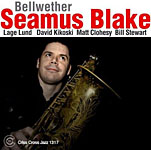Home » Jazz Articles » Album Review » Ergo: Multitude, Solitude
Ergo: Multitude, Solitude
The group dates back to 2003, when trombonist Brett Sroka—whose Hearsay (Fresh Sound New Talent, 2002) was a far more conventional outing—formed Ergo to formalize time spent, since the beginning of the decade, listening to and experimenting with electronic music. Drummer Shawn Baltazor is the relative newcomer to the trio, but on Multitude, Solitude Sroka continues his working relationship with keyboardist Carl Maguire, whose Floriculture group has released two fine discs including Sided Silver Solid (2009)—released on Taylor Ho Bynum's Firehouse 12 label and bearing no small affiliation to the trumpeter's musical space, an outgrowth of reedman Anthony Braxton's decades-long experimentation.
But the music of Ergo bears little, if any, relationship to any of the above. This is music that evolves slowly, almost imperceptibly; yet for all its freedom, there's no shortage of structure. Closer in ambience to classical chamber music, the album's two longest pieces are particularly compelling. "Endlessly (multitude, solitude)," with its layers of trombone—in Sroka's hands, truly a vocal instrument—possesses the same paradoxical stasis-meets-forward-motion of Norwegian saxophonist Trygve Seim's outstanding Sangam (ECM, 2005). Laconic, serpentine trombone lines unfold, supported by Maguire's chime-like Fender Rhodes, Baltazor largely providing more color than pulse.
The episodic "Vessel" is another story entirely. Spare trombone lines lead to low, in-the-gut electronics and more turbulent passages, where Maguire's oblique Rhodes lines and Baltazor's tumultuous playing build to a mini-climax, only to dissolve and build again—even more gradually—to a second peak, pushed forward by a persistent, minimalist piano pulse that shapes an entirely different context for Sroka's singable theme.
Shorter pieces like "She Haunts Me" rely on processing to allow Sroka to build up layers of trombone. Some are clearly overdubbed, but Sroka truly blurs the line between what's possible in the studio and what can be done in a live context. Hints of Philip Glass, Steve Reich, and Terry Riley imbue Sroka's writing, but never come to the forefront.
And there's no doubt that Ergo is both a performing and improvising group. Like Norwegian artists like Arve Henriksen, however, Sroka takes a different approach to composition, one where improvisation and structure work hand-in-hand, each feeding the other. Multitude, Solitude's 50 tranquil minutes ebb and flow with stunning realism in a landscape of otherworldly textures.
Track Listing
Rana Sylvatica; Vessel; She Haunts Me; Little Shadow; Endlessly (multitude, solitude); Actuator.
Personnel
Ergo
composer / conductorBrett Sroka: trombone, computer; Carl Maguire: Rhodes electric piano, Prophet synthesizer, electronic effects; Shawn Baltazor: drums.
Album information
Title: Multitude, Solitude | Year Released: 2009 | Record Label: Cuneiform Records
Tags
PREVIOUS / NEXT
Support All About Jazz
 All About Jazz has been a pillar of jazz since 1995, championing it as an art form and, more importantly, supporting the musicians who make it. Our enduring commitment has made "AAJ" one of the most culturally important websites of its kind, read by hundreds of thousands of fans, musicians and industry figures every month.
All About Jazz has been a pillar of jazz since 1995, championing it as an art form and, more importantly, supporting the musicians who make it. Our enduring commitment has made "AAJ" one of the most culturally important websites of its kind, read by hundreds of thousands of fans, musicians and industry figures every month.



















